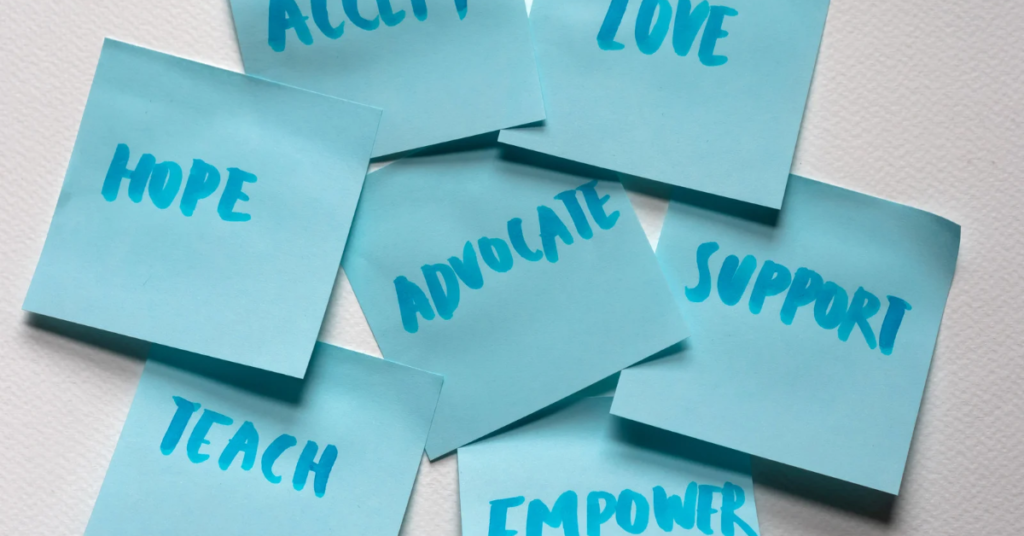
Introduction: Why Self-Advocacy Matters
Self-advocacy isn’t selfish. It’s actually one of the kindest things you can do for yourself. When you speak up, you’re not pushing others away—you’re finally showing up for you. Many women hold back because they’ve been told to stay quiet, be “nice,” or not rock the boat. But staying silent often leads to feeling unseen, unheard, and emotionally drained.
If you’ve ever felt guilty just for saying what you need, you’re not alone. Guilt is common—especially if you’ve been through trauma, emotional dependency, or a painful breakup. Maybe you’ve lost your voice in trying to keep the peace or please everyone. It’s okay. You’re not broken—you’re just rediscovering your power.
Real growth starts when you learn to say, “This matters to me.” That’s when healing begins. As Brené Brown says, “Vulnerability is not winning or losing; it’s having the courage to show up.” And showing up for yourself? That’s brave.
Self-advocacy is your path back to trust, self-love, and emotional healing. You don’t need to do it alone. Just take one small, honest step. You deserve a life that reflects your truth—not one shaped by fear or silence.
What Is Self-Advocacy—and What It’s Not
Self-advocacy is simply the act of standing up for yourself—with love, not loudness. It’s about honoring your needs, feelings, and voice. It doesn’t mean you have to be forceful. It just means you stop hiding what truly matters to you.
You don’t have to shout to be heard. You don’t have to fight to prove your worth. Self-advocacy isn’t about rebellion or pushing others away. It’s about saying, “I count too,” even when your voice shakes. Especially when your voice shakes.
Many women were taught that speaking up is rude or disrespectful. Maybe you grew up hearing, “Don’t talk back,” or “Be nice.” Over time, you started believing that your needs were less important. That kind of cultural conditioning runs deep—and it creates guilt every time you try to assert yourself.
But here’s the truth: expressing your needs isn’t selfish. It’s self-care. When you hold everything in, the pressure builds. Eventually, it spills out in tears, burnout, or resentment. And you deserve so much more than that.
Think of self-advocacy as your inner compass. It gently steers you back to your truth. Maya Angelou once said, “Stand up straight and realize who you are. You are powerful and valuable.” That’s what self-advocacy is all about—remembering your power, even when the world tries to dim it.
You don’t need to become someone else. You just need to come back to yourself. One boundary, one honest word, one small moment of courage at a time.
So, the next time you feel the guilt creeping in, pause. Take a breath. And remind yourself: advocating for your needs is not a betrayal of others—it’s a deep act of self-love.
Why Women Struggle to Speak Up

If speaking up feels hard for you, know this—you’re not alone. Self-advocacy is tough when your heart’s been through a lot. Maybe you’ve spent years putting others first. Maybe you’re used to tiptoeing around conflict just to keep the peace.
Emotional dependency can sneak in quietly. You might feel like your happiness depends on someone else’s approval. And so, you stay silent—not because you don’t have anything to say, but because you’re afraid it might push them away.
Then there’s people-pleasing. You want everyone to be okay. But in trying to please everyone, you end up neglecting your own needs. You say “yes” when you want to say “no.” And deep down, it leaves you tired and invisible.
Many women carry past wounds—trauma, rejection, or being told they were “too much.” It’s hard to find your voice when it was silenced for so long. You may question your worth or feel like your feelings don’t matter.
But they do. You matter. As Audre Lorde said, “Your silence will not protect you.” Speaking up isn’t about being perfect. It’s about being real. And that’s where self-advocacy begins—when you finally choose to honor your truth. If you’re experiencing any of these signs,let’s talk!
The Guilt Barrier: Why You Feel Bad for Speaking Up
Let’s talk about guilt—the sneaky emotion that shows up just when you start practicing self-advocacy. You speak your truth, set a boundary, or say “no,” and suddenly, there it is… guilt. Heavy, uncomfortable, and confusing.
But guilt isn’t a sign that you’ve done something wrong. It’s often a result of years—maybe decades—of emotional suppression. If you were raised to be the “good girl,” the peacemaker, or the one who kept quiet, guilt was wired in early.
Family dynamics play a huge role. Maybe your voice wasn’t welcome growing up. Maybe you learned to shrink so others could shine. At work, speaking up might’ve been labeled “difficult” or “dramatic.” In relationships, asking for more might’ve made someone pull away. So, over time, you stayed small.
That guilt? It’s not your truth. It’s just an old habit dressed as a warning sign.
The problem is, guilt can block your healing. It whispers, “Don’t ask for that,” or “You’re being selfish.” But what if asking is how you start to heal? What if honoring your needs is the key to fulfillment?
As Glennon Doyle says, “Every time you’re given a choice between disappointing someone else and disappointing yourself, your duty is to disappoint that someone else.”
You’re not here to live quietly in the corners of your life. You’re here to live fully, honestly, and with joy. Self-advocacy isn’t about pushing people away. It’s about inviting yourself back in.
So next time guilt shows up, thank it for trying to protect you—and then move forward anyway. Because your healing, your happiness, and your truth are worth it.
Learning the Language of Self-Worth

Self-advocacy starts with the way you speak—to others, yes, but especially to yourself. If your inner voice has been critical or quiet for too long, it’s time to rewrite the script.
Instead of saying, “I’m sorry, but…,” try, “Thank you for understanding my need for…” Small shifts in language make a big difference. You’re not being mean. You’re being clear. And clarity is kindness.
Affirmations are gentle tools that help rebuild your self-worth. Say it with me: “My needs matter.” “It’s okay to take up space.” “I can speak my truth with love.” Say these out loud. Say them often. Over time, your inner voice will believe them too.
Setting boundaries doesn’t mean slamming doors. It means placing soft fences around your peace. You can say, “I’m not available for that right now,” or “That doesn’t work for me.” It’s not rejection—it’s self-respect.
You’ve spent years caring for others. Now it’s your turn to be heard, loved, and understood—starting with you. Reclaiming your voice might feel scary, but it’s also deeply freeing. Speak with honesty, but lead with heart. That’s what makes self-advocacy so powerful.
As Oprah once said, “You get in life what you have the courage to ask for.” You don’t need to yell. You just need to ask—gently, clearly, and with love.
So go ahead. Choose words that reflect your worth. Set boundaries that protect your joy. And speak up, not with guilt, but with grace. Because your voice is your power—and it’s time the world hears it.
How GrowMyHappiness Can Support Your Journey

Choosing self-advocacy doesn’t mean walking the path alone. Sometimes, the most powerful thing you can do is ask for help.
That’s where GrowMyHappiness steps in—not to fix you, but to walk beside you while you rebuild your life. Our life coaching support isn’t about pushing you into a new version of yourself. It’s about helping you reconnect with the real you—the one who’s always been there, quietly waiting to be heard.
You may be carrying wounds from emotional dependency or broken trust. It’s okay. Healing doesn’t have to be rushed. With the right support, you can gently rebuild your confidence and learn to trust yourself again. That inner voice? It gets stronger with care, not pressure.
Our coaching is tailored to you—your story, your pace, your truth. You’ll explore emotional healing, identify limiting patterns, and discover your purpose in a safe and judgment-free space.
You’ll learn how to create boundaries, speak with clarity, and maintain relationships that feel supportive—not draining. And if financial independence is your goal, we’ll guide you with small, sustainable steps. Because building a secure life isn’t just possible—it’s yours to claim.
You don’t need to be perfect to start. You just need to be willing.
We believe your story isn’t over. In fact, a powerful new chapter is just beginning—one where self-advocacy isn’t something you fear, but something you own. With the right tools, encouragement, and support, you’ll step into the life you were always meant to live.
As Brené Brown says, “Owning our story and loving ourselves through that process is the bravest thing that we’ll ever do.” Let’s begin that journey—together.
You already have the strength. We’re just here to remind you how to use it.
Small Steps to Begin Speaking Up Today
Starting your self-advocacy journey doesn’t have to be loud or dramatic. It begins with small, gentle steps you can take today.
Write a self-advocacy script.
Think of a situation where you usually stay silent—maybe at work, with family, or in relationships. Write down what you wish you could say. Keep it short, kind, and clear. Practicing this in advance builds confidence.
Start journaling.
Take five minutes a day to explore your unmet needs. What made you feel unheard today? What would you say if fear wasn’t in the way? Writing clears emotional clutter and reveals truths you’ve been holding in.
Say “no” gently.
Practice setting tiny boundaries in safe spaces. Say, “I’d rather not today,” or “I need some rest.” You’re not being rude—you’re being real.
Try voice notes.
Record yourself stating your needs or affirmations like, “I matter,” or “It’s okay to ask for what I need.” Hearing your voice can be healing.
Self-advocacy grows through kindness, not pressure. As you take these small steps, remember—you’re not just speaking up. You’re coming home to yourself.Tried the steps above and feel ready for more support?Ready to find your voice? Explore more speaking tips in our latest blog post!
Closing Thoughts: Your Voice is Your Power

Self-advocacy isn’t a luxury—it’s a lifeline. It’s how you return to yourself after years of silence or self-doubt.
You don’t have to roar. Whispering your truth is powerful too. Speaking up doesn’t mean conflict—it means connection. With your values. Your needs. Your worth.
If you’ve ever felt like your voice didn’t matter, let this be your reminder: it does. You matter. Your feelings are valid. Your needs are important.
There’s no perfect way to begin. Maybe today, you set one small boundary. Maybe tomorrow, you ask for help. Each step counts.
You’re not alone on this path. Others are walking it too—with shaky voices, hopeful hearts, and a quiet strength that grows every day.
As Maya Angelou said, “Each time a woman stands up for herself, she stands up for all women.” Including the woman you used to be.
Support is always here when you’re ready. Whether through journaling, coaching, or simply breathing through a tough moment—you are never without options.
So keep showing up for yourself. Keep listening. Keep choosing you. Because your voice? It’s not just sound. It’s your power. And it’s time the world hears it.
